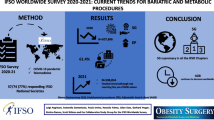Abstract
Purpose of Review
Knowledge regarding postoperative outcomes after bariatric and metabolic surgery continues to evolve. This review highlights key findings in outcomes research over the last 5 years related to weight loss, remission of obesity-related disease, reflux, revisional surgery, robotic-assisted surgical platforms, and adolescent populations.
Recent Findings
Sleeve gastrectomy (SG) and Roux-en-Y gastric bypass (RYGB) produce similar weight loss patterns at 5 years, while duodenal switch (BPD/DS) and related procedures are associated with maximal weight loss overall and optimal resolution of obesity-related comorbidities. Remission of type 2 diabetes mellitus (T2DM) following surgery is more likely in patients who are not insulin dependent prior to surgery. Bariatric and metabolic surgery offers a significant protective effect against coronary artery disease (CAD) and associated interventions in both diabetic and nondiabetic patients, as well as heart failure (HF). Gastroesophageal reflux disease (GERD) and dysphagia following SG are common, and routine endoscopic surveillance for Barrett’s esophagus may be of significant utility. Robotic-assisted laparoscopic platforms concur similar outcomes to laparoscopic intervention, with a potential benefit in high BMI patients. Revisional surgery is most commonly performed for weight regain and/or inadequate weight loss following an index procedure, or reflux, and generally characterized by higher postoperative complication rates and longer inpatient lengths of stay (LOS). Surgical intervention in adolescent populations has similar weight loss and postoperative complication profiles to those seen in adult populations, with improved outcomes related to T2DM.
Summary
Bariatric and metabolic surgery continues to evolve as a treatment for obesity and obesity-related comorbidities. While effective for weight loss and remission of obesity-related disease, SG is associated with high rates of postoperative GERD.
Similar content being viewed by others
References
Papers of particular interest, published recently, have been highlighted as: • Of importance •• Of major importance
Metabolic and Bariatric Surgery Accreditation and Quality Improvement Program (2015-2018). Participant use data file [Database]. Retrieved from https://reports.nsqip.facs.org/acsMbsaqip.
• Peterli R, Wolnerhanssen BK, Peters T, et al. Effect of laparoscopic sleeve gastrectomy vs laparoscopic Roux-en-Y gastric bypass on weight loss at 5 years among patients with morbid obesity: the SM-BOSS randomized clinical trial. JAMA 2018:319(3):255–65. A randomized-controlled trial of 217 patients who underwent RYGB or SG: while weight loss outcomes favored RYGB, no statistically significant differences in excess BMI lost at 5 years were identified between the two procedures.
• Salminen P, Helmio M, Ovaska J, et al. Effect of laparoscopic sleeve gastrectomy vs laparoscopic Roux-en-Y gastric bypass on weight loss at 5 years among patients with morbid obesity: The SLEEVEPASS randomized clinical trial. JAMA 2018;319(3):241–54. While postoperative weight loss patterns between SG and RYGB fail to demonstrate clinical equivalence of the two procedures, RYGB is not associated with a statistically significant weight loss benefit at 5 years.
• Adams TD, Davidson LE, Litwin SE, et al. Weight and metabolic outcomes 12 years after gastric bypass. NEJM 2017:377(12):1143–55. Randomized-controlled trial examining long-term outcomes of patients who undergo RYGB. Initial weight loss and T2DM remission patterns observed at 2 years were reasonably well-sustained at 6 and 12 years, although mild increase in study population mean body weight and decrease in the T2DM remission rate were observed over time. Overall remission of T2DM was best predicted by baseline medication status.
Merz AE, Blackstone RB, Gagner M, Torres AJ, Himpens J, Higa KD, et al. Duodenal switch in revisional bariatric surgery: conclusions from an expert consensus panel. Surg Obes Relat Dis. 2019;15(6):894–9.
Balibrea JM, Vilallonga R, Hidalgo M, Ciudin A, González Ó, Caubet E, et al. Mid-term results and responsiveness predictors after two-step single-anastomosis duodeno-ileal bypass with sleeve gastrectomy. Obes Surg. 2017;27(5):1302–8.
Buchwald H, Estok R, Fahrbach K, Banel D, Jensen MD, Pories WJ, et al. Weight and type 2 diabetes after bariatric surgery: systematic review and meta-analysis. Am J Med. 2009;122(3):248–56.
Kanerva N, Larsson I, Peltonen M, Lindroos AK, Carlsson LM. Changes in total energy intake and macronutrient composition after bariatric surgery predict long-term weight outcome: findings from the Swedish Obese Subjects (SOS) study. Am J Clin Nutr. 2017;106(1):136–45.
Wolfe BM, Kvach E, Eckel RH. Treatment of obesity: weight loss and bariatric surgery. Circ Res. 2016;118(11):1844–55.
Mingrone G, Panunzi S, De Gaetano A, et al. Bariatric-metabolic surgery versus conventional medical treatment in obese patients with type 2 diabetes: 5 year follow-up of an open-label, single-centre, randomized controlled trial. Lancet. 2015;386(9997):964–73.
Schauer PR, Bhatt DL, Kirwan JP, Wolski K, Aminian A, Brethauer SA, et al. Bariatric surgery versus intensive medical therapy for diabetes – 5-year outcomes. NEJM. 2017;376(7):641–51.
Khorgami Z, Shoar S, Saber AA, Howard CA, Danaei G, Sclabas GM. Outcomes of bariatric surgery versus medical management for type 2 diabetes mellitus: a meta-analysis of randomized controlled trials. Obes Surg. 2019;29(3):964–74.
Alkharaiji M, Anyanwagu U, Donnelly R, Idris I. Effect of bariatric surgery on cardiovascular events and metabolic outcomes in obese patients with insulin-treated type 2 diabetes: a retrospective cohort study. Obes Surg. 2019;29(10):3154–64.
Aminiam A, Zajichek A, Arterburn DE, et al. Association of metabolic surgery with major adverse cardiovascular outcomes in patients with type 2 diabetes and obesity. JAMA. 2019 Sep;2 Epub ahead of print.
Michaels AD, Mehaffey JH, Hawkins RB, Kern JA, Schirmer BD, Hallowell PT. Bariatric surgery reduces long-term rates of cardiac events and need for coronary revascularization: a propensity-matched analysis. Surg Endosc. 2019 Aug;2 Epub ahead of print.
Ramani GV, McCloskey C, Ramanathan RC, Mathier MA. Safety and efficacy of bariatric surgery in morbidly obese patients with severe systolic heart failure. Clin Cardiol. 2008;31(11):516–20.
McCloskey CA, Ramani GV, Mathier MA, et al. Bariatric surgery improves cardiac function in morbidly obese patients with severe cardiomyopathy. Surg Obes Relat Dis. 2007;3(5):503–7.
Aleassa EM, Khorgami Z, Kindel TL, Tu C, Tang WHW, Schauer PR, et al. Impact of bariatric surgery on heart failure mortality. Surg Obes Relat Dis. 2019;15(7):1189–96.
Sundström J, Bruze G, Ottosson J, Marcus C, Näslund I, Neovius M. Weight loss and heart failure: a nationwide study of gastric bypass surgery versus intensive lifestyle treatment. Circulation. 2017;135(17):1577–85.
Lauby-Secretan B, Scoccianti C, Loomis D, Grosse Y, Bianchini F, Straif K, et al. Body fatness and cancer – viewpoint of the IARC Working Group. NEJM. 2016;375:794–8.
Casagrande DS, Rosa DD, Umpierre D, Sarmento RA, Rodrigues CG, Schaan BD. Incidence of cancer following bariatric surgery: systemic review and meta-analysis. Obes Surg. 2014;24(9):1499–509.
Schauer DP, Feigelson HS, Koebnick C, Caan B, Weinmann S, Leonard AC, et al. Association between weight loss and the risk of cancer after bariatric surgery. Obesity. 2017;25(Suppl 2):S52–7.
Schauer DP, Feigelson HS, Koebnick C, Caan B, Weinmann S, Leonard AC, et al. Bariatric surgery and the risk of cancer in a large multicenter cohort. Ann Surg. 2019;269(1):95–101.
Arterburn D, Gupta A. Comparing the outcomes of sleeve gastrectomy and Roux-en-Y gastric bypass for severe obesity. JAMA. 2018;319(3):235–7.
Castaneda D, Popov VB, Wander P, Thompson CC. Risk of suicide and self-harm is increased after bariatric surgery – a systematic review and meta-analysis. Obes Surg. 2019;29(1):322–33.
Ko BJ, Myung SK, Cho KH, Park YG, Kim SG, Kim do H, Kim SM. Relationship between bariatric surgery and bone mineral density: a meta-analysis. Obes Surg 2016;26(7):1414–1421.
Lupoli R, Lembo E, Saldalamacchia G, Kesia Avola C, Angrisani L, Capaldo B. Bariatric surgery and long-term nutritional issues. World J Diabetes. 2017;8(11):464–74.
Mandeville Y, Van Looveren R, Vancoillie PJ, et al. Moderating the enthusiasm of sleeve gastrectomy: up to fifty percent of reflux symptoms after ten years in a consecutive series of one hundred laparoscopic sleeve gastrectomies. Obes Surg. 2017;27(7):1797–803.
•• Genco A, Soricelli E, Casella G, et al. Gastroesophageal reflux disease and Barrett’s esophagus after laparoscopic sleeve gastrectomy: a possible, underestimated long-term complication. Surg Obes Relat Dis 2017;13(4):568–74. Retrospective study evaluating GERD symptoms, PPI use, and endoscopic findings in patients who underwent SG at an average of 58 months following surgery. While reflux symptoms and PPI use were present in a majority of patients, significantly increased rates of erosive esophagitis and Barrett’s esophagitis were also identified, with no significant correlation with reflux symptoms.
Ebrahimi R, Kermansaravi M, Khalaj A, Eghbali F, Mousavi A, Pazouki A. Gastro-intestinal tract cancers following bariatric surgery: a narrative review. Obes Surg. 2019;29(8):2678–94.
Soricelli E, Casella G, Baglio G, Maselli R, Ernesti I, Genco A. Lack of correlation between gastroesophageal reflux disease symptoms and esophageal lesions after sleeve gastrectomy. Surg Obes Relat Dis. 2018;14(6):751–6.
Cano-Valderrama O, Sánchez-Pernaute A, Rubio-Herrera MA, Domínguez-Serrano I, Torres-García AJ. Long-term food tolerance after bariatric surgery: comparison of three different surgical techniques. Obes Surg. 2017;27(11):2868–72.
Acevedo E Jr, Mazzei M, Zhao H, Lu X, Soans R, Edwards MA. Outcomes in conventional laparoscopic versus robotic-assisted primary bariatric surgery: a retrospective, case-controlled study of the MBSAQIP database. Surg Endosc. 2019 Jun;17 Epub ahead of print.
Ecker BL, Maduka R, Ramdon A, Dempsey DT, Dumon KR, Williams NN. Resident education in robotic-assisted vertical sleeve gastrectomy: outcomes and cost-analysis of 411 consecutive cases. Surg Obes Relat Dis. 2016;12(2):313–20.
Fulton C, Sheppard C, Birch D, Karmali S, de Gara C. A comparison of revisional and primary bariatric surgery. Can J Surg. 2017;60(3):205–11.
Dijkhorst PJ, Boerboom AB, Janssen IM, et al. Failed sleeve gastrectomy: single anastomosis duodenoileal bypass or Roux-en-Y gastric bypass? A multicenter cohort study. Obes Surg. 2018;28(12):3834–42.
Inge TH, Zeller MH, Jenkins TM, Helmrath M, Brandt ML, Michalsky MP, et al. Perioperative outcomes of adolescents undergoing bariatric surgery: the Teen-Longitudinal Assessment of Bariatric Surgery (Teen-LABS) study. JAMA Pediatr. 2014;168(1):47–53.
• Inge TH, Laffel LM, Jenkins TM, et al. Comparison of surgical and medical therapy for type 2 diabetes in severely obese adolescents. JAMA Pediatr 2018;172(5):452–60. Subanalysis of the Teen-LABS study demonstrating robust efficacy of bariatric and metabolic surgical intervention in treating youth-onset T2DM in severely obese adolescents, with improved outcomes compared to adult populations.
Michalsky MP, Inge TH, Jenkins TM, et al. Cardiovascular risk factors after adolescent bariatric surgery. Pediatrics 2018;141(2). pii:e20172485.
Ryder JR, Edwards NM, Gupta R, Khoury J, Jenkins TM, Bout-Tabaku S, et al. Changes in functional mobility and musculoskeletal pain after bariaric surgery in teens with severe obesity: Teen-Longitudinal Assessment of Bariatric Surgery (LABS) study. JAMA Pediatr. 2016;170(9):871–7.
Armstrong SC, Bolling CF, Michalsky MP, Reichard KW. Pediatric metabolic and bariatric surgery: evidence, barriers, and best practices. Pediatrics 2019;144(6): pii: e20193223.
Author information
Authors and Affiliations
Corresponding author
Additional information
Publisher’s Note
Springer Nature remains neutral with regard to jurisdictional claims in published maps and institutional affiliations.
This article is part of the Topical Collection on Health Services and Programs
Rights and permissions
About this article
Cite this article
Roth, A.E., Thornley, C.J. & Blackstone, R.P. Outcomes in Bariatric and Metabolic Surgery: an Updated 5-Year Review. Curr Obes Rep 9, 380–389 (2020). https://doi.org/10.1007/s13679-020-00389-8
Published:
Issue Date:
DOI: https://doi.org/10.1007/s13679-020-00389-8




